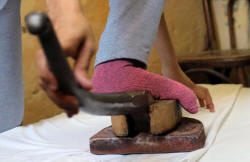|
 Egypt
carries on tradition of steam-free 'foot ironing' Egypt
carries on tradition of steam-free 'foot ironing'
 Send a link to a friend
Send a link to a friend
[August 15, 2017]
ALEXANDRIA, Egypt (Reuters)
- In a narrow alleyway in the heart of Egypt's coastal
city of Alexandria, Ebtesam Mohamed is busy working on a
decades-old Egyptian tradition of ironing clothes using
her feet.
|
|
 Unlike in regular ironing, she smoothes out
creases by sliding a large hot metal slab weighing nearly 40
kilograms (88 pounds) back and forth with her foot. There is a
piece of wood between the iron and her foot to protect it from
the heat. Unlike in regular ironing, she smoothes out
creases by sliding a large hot metal slab weighing nearly 40
kilograms (88 pounds) back and forth with her foot. There is a
piece of wood between the iron and her foot to protect it from
the heat.
Mohamed, a 45-year-old single mother, has been doing the job for
the past 35 years, inheriting the trade from her mother and
grandfather.
"I was 10 years old when I first started ironing, and I couldn't
even lift the iron from the oven to the table," she said.
"We call this little oven the 'house of fire'. It hasn't changed
since we started, but (new) heating methods have been developed
from kerosene to gas-filled canisters to what we use now, which
is natural gas. This is probably the only thing that has changed
in the shop."

Hand-held, electric and steam irons may pose stiff competition
now but Mohamed says her technique is more effective than
regular irons because of the increased pressure and weight
applied to the clothes.
[to top of second column] |

It usually takes her up to 20 minutes to iron a single piece of
clothing, moving her leg back and forth several times to ensure the
garment is crease-free.
"I heat the iron depending on the amount of work I have. If I have
to iron three or four pieces of clothing, that would require the
iron to be at a certain temperature, and if I have to iron one
piece, it would require a different temperature. So it all depends
on the workload," she said.
Mohamed's loyal customers say they prefer her method to the standard
one. And some are surprised to see a woman taking up a trade that is
usually the preserve of ironing men, or "makwagi".
She charges between two and five Egyptian pounds ($0.11-$0.28) per
piece.
(Reporting by Mohamed Zaki; editing by Parul Gupta/Mark Heinrich)
[© 2017 Thomson Reuters. All rights
reserved.] Copyright 2017 Reuters. All rights reserved. This material may not be published,
broadcast, rewritten or redistributed. |